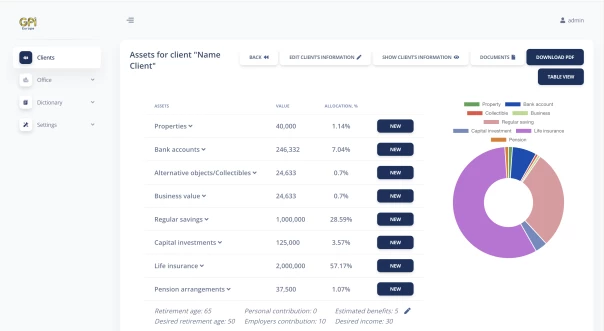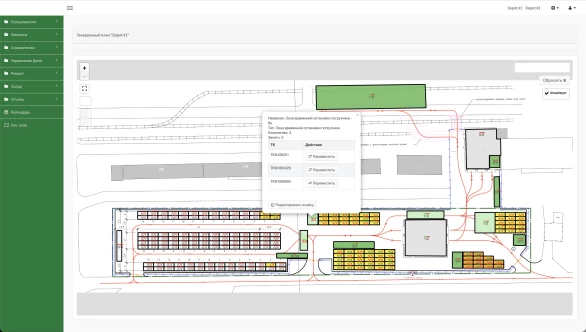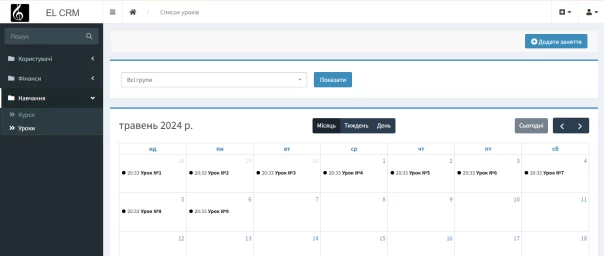WMS systems
Business automation with WMS is an effective tool for optimizing warehouse processes. Functional capabilities of WMS systems. Ready-made or individually developed software.

CRM System Replatforming for Financial Consultants
More about the serviceCRM System Development
We provide a full range of services for the development and support of online stores, informational websites, CRM/ERP systems, and SEO optimization — from creating technical specifications and prototyping to configuration, launch, and ensuring the quality and stability of your product.

Development and Support of ERP for a Tank Washing and Repair Depot
More about the serviceERP System Development
We develop custom ERP systems — comprehensive solutions for automating and integrating key business processes (finance management, HR, production, supply chain, sales, and more). We provide a full cycle of services: needs analysis and technical specification development, architecture design, system development and integration with existing solutions, implementation with staff training, as well as technical support and regular updates.

Online stores for beauty professionals.
More about the serviceOnline Store Development
Online store development is a comprehensive process of creating an e‑commerce platform tailored to all client requirements — from preparing technical specifications, prototyping, and design to implementing the website and admin panel, testing, content integration, and ongoing support. This ensures a convenient UX for customers and seamless store operation.

Development of an SEO-optimized informational website for a well drilling company.
More about the serviceDevelopment of informational websites
The development of an informational website is essential for those who aim to showcase their activities online and attract new clients: a modern business card website allows for flexible content updates through an admin panel, displays news and links to social media, and is optimized for search engines, retaining existing audiences and increasing brand trust.

SEO website promotion — boosting visibility and attracting clients from search
We help businesses receive a stable flow of clients from Google. SEO promotion is not just about keywords, but a comprehensive set of work — from technical optimization and content to analytics and link-building.
We create business websites for companies of any size
We develop modern business websites that help present your company, attract new clients, and increase brand trust. These can be landing pages, corporate websites, or multi-page portals with additional functionality.

Content creation — texts, visuals, and videos for your business
We combine the power of artificial intelligence with the expertise of our copywriters, designers, and video editors. We create texts, visuals, and videos that help your brand look professional, communicate effectively, and attract customers.
We create convenient business card websites for companies of any scale
We develop business card websites that help quickly present services, increase recognition, and attract clients. Such websites are ideal for specialists, small companies, or brands that require a compact yet professional online presence.

Content management — professional content creation and support for your website
We take care of all tasks related to content creation, updates, and website structure. Content management is a set of services that includes adding texts, photos, products, news, SEO elements, and keeping your website up to date.

Server administration — stable performance, security, and productivity for your business
We provide full technical server administration to ensure your websites and services run reliably 24/7. Our team has been working for years with Hetzner — one of the most reliable European data centers. We know how to properly configure, optimize, and maintain the infrastructure for your project.
We create intelligent chatbots for Telegram, Viber, WhatsApp, and websites
We develop chatbots that automate customer communication, sales, and technical support. Bots help respond faster, collect requests, accept payments, and operate 24/7 without days off.

Screenshot of the warehouse management module
View Case
ERP system for managing a tank container cleaning and repair station, built on Symfony and deployed on Linux Ubuntu with MySQL for reliability and scalability. The solution includes an administrative panel and a client portal with 49 modules for managing clients, orders, finances, calendar, inventory, and reporting, with capabilities for automatic PDF invoice generation, notifications, and data export to accounting software for complete business process digitalization.

Homepage of the website, VIP announcements block
View Case
A platform for posting announcements in the agricultural sector, connecting farmers, suppliers, and buyers to streamline the buying and selling of agricultural goods and services with increased market transparency and reduced search costs. The system includes an admin panel for moderating announcements, managing content, and analytics, as well as a seller's personal account with the ability to publish and manage announcements and transaction history.

Homepage of the website, VIP announcements block
View Case
A CRM system for a financial consulting company, developed as a custom solution instead of a SaaS product to automate document management and enhance client interaction through admin and client interfaces, with capabilities to manage assets, users, calendars, and dictionaries, generate PDF reports, and synchronize events with Outlook. The project is built on Symfony with PHP 8.3, deployed on Ubuntu 22.04 with a MySQL 8.0 database to ensure system reliability, security, and scalability.

Main Menu of the Project
View Case
Informational website Aquamen for water well drilling services, built with a user‑friendly admin panel for managing users, content blocks, and a feedback module. It supports SEO features (automatic sitemap, no‑index/no‑follow) and sends notifications about new requests via a Telegram bot.

Home Page, Main Menu
View Case
Online store for beauty professionals, developed on Symfony 6.4 and PHP 8.3, deployed on an Ubuntu 22.04 server with a MySQL 8.0 database. It features an intuitive client interface with a product catalog, shopping cart, and order checkout, along with a powerful admin panel for managing products, categories, brands, users, orders, and SEO optimization. The system supports data export and automatic generation of PDF invoices and reports.

Website Home Page, Users, Finance, Learning
View Case
CRM system for a foreign language school designed to efficiently manage student relationships: it enables storing and structuring personal data, course history, and communication records, while automating registration, payment, and class scheduling processes through three key modules — Users, Finance, and Learning.

Website Home Page, Users, Finance, Learning
View Case
A custom CRM system for a service business in the truck detailing industry. The solution enables centralized management of clients, services, orders, payments, and staff, automates payroll calculations, and provides detailed business analytics.

Website Home Page, Users, Finance, Learning
View Case
A Telegram bot with an administrative panel was developed for the client, allowing for the automation of order intake, product catalog management, and request processing without operator involvement. The solution is designed for fast customer service and easy management for the business.

Types of WMS systems – are out of box ones, adapted and personalized management systems. For which business categories they are intended. Examples of some WMS and a basic description of how they work.
Modern business is undergoing dramatic changes by adapting to the realities of the world. In parallel with it, warehouse management systems are also being transformed, which we described in the article “WMS system is”. Adapting to new business models, WMS are divided into several types for greater adaptability and process automation.
Businesses vary in scale and scope of activity. Accordingly, warehouse management systems differ in their functionality, because the same product is not suitable for different companies.
There are three basic types of WMS.
This is a system that is completely ready to be installed and start working. The customer can make the necessary adjustments to the complex, but the list of changes is limited – the software has exactly the functionality that the developer planned. An out of box WMS has mostly a basic set of functions. Some manufacturers of such software expand the capabilities of the basic package with additional ones through licenses.
Most often, out of box automation systems run on the standard Windows operating system. A popular solution among Ukrainian customers is the 1C system. However, it is difficult to attribute this software to a full-fledged WMS, as the out of box version has significantly limited functionality.
Adaptive examples of WMS systems are common among companies of various sizes. The most popular implementation of a WMS system in a warehouse is of this type, such software has proven itself in the medium and large business segment, where the warehouse is of great importance in the entire work cycle.
The complex has a core – the basis of all software. Additional modules are installed at the request of the customer. This is not only beneficial functionally, but also financially – the client pays only for what he needs.
These are complex, expensive, but completely custom systems. Each product is individual and has no analogues on the market. Such software is ordered by companies with large warehouse complexes, many products, and related processes. Although the cost of this type of WMS is quite high, small businesses often order such software due to the high level of adaptability to the business and the possibility of a one-time injection of funds, rather than using a monthly subscription.
Proprietary WMS are written from scratch. It can take a year or more from the moment of studying the business and preparing for the full integration of the product.
Here are examples of popular international WMS systems:
It is also worth paying attention to Ukrainian developers whose products are adapted to local peculiarities.
The process of a warehouse management system can be briefly described as follows:
Certain types of WMS systems will suggest the optimal type of packaging, what goods are planned for delivery and signal the expiration date (for the relevant product category). All information is generated in a convenient reporting form, which the client (owner) can view and make adjustments.

Business automation with WMS is an effective tool for optimizing warehouse processes. Functional capabilities of WMS systems. Ready-made or individually developed software.

WMS systems for the logistics business. Features of using WMS in Ukraine – the most common functionality. Top warehouse management systems in Ukraine.

In this article, you will be able to read a brief overview of the development of a store based on online platforms and CMS. The information in the article will help you choose the right way for you.
Fill out the form to receive a free consultation
